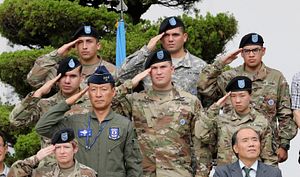Defense Secretary Mark Esper said Wednesday that he is open to the possibility of altering American military activities in South Korea if it would help advance a diplomatic deal with North Korea to eliminate its nuclear program.
In an interview with reporters flying with him to Seoul, Esper said any changes in military exercises or training would be done in ways that did not jeopardize troops’ combat preparedness. And he said they would be done in consultation with the South Korean government.
He would not say what specific adjustments might be contemplated. The United States and South Korea already scaled back their 2018 and 2019 military exercises in the hope that it would help move North Korea toward agreement to give up its nuclear weapons. So far that has not worked.
“We will adjust our exercise posture, either more or less, depending on what diplomacy may require,” Esper said, adding, “We have to be open to all those things that empower and enable our diplomats” in the nuclear talks.
North Korea has long objected strongly to large-scale American and South Korean military exercises, which it calls preparations for an invasion of the North. President Donald Trump also has criticized the exercises as too costly and provocative, but U.S. military commanders consider them crucial to deterring North Korea and ensuring that any invasion by the North would fail.
“As we consider adjusting — either dialing up or dialing down — exercises, training, stuff like that, we want to do that in close collaboration with our (South) Korean partners, not as a concession to North Korea but, again, as a means to keep the door open to diplomacy,” he said.
Esper said he takes seriously North Korea’s statement that the end of this year is a deadline for the U.S. to change its approach to the nuclear negotiations.
He said he is hopeful that diplomacy will prevail, given the history of tensions on the Korean Peninsula since the North Koreans began launching intercontinental-range ballistic missiles that could eventually be nuclear-armed.
Esper recalled his concern about the prospects for war on the peninsula when he became Army secretary in 2017.
“We were on the path to war,” he said. “It was very clear to me because the Army was making preparations.” He did not elaborate.
The U.S. has about 28,000 troops in South Korea, and Esper said they must be ready to fight the North at a moment’s notice.
Esper also said that during his talks in Seoul this week with his South Korean counterpart, he will express U.S. concern about Seoul’s stated plan to withdraw from an intelligence-sharing pact with Japan. Esper said the dispute between Tokyo and Seoul is only helping North Korea and China.
Robert Burns for the Associated Press.

































